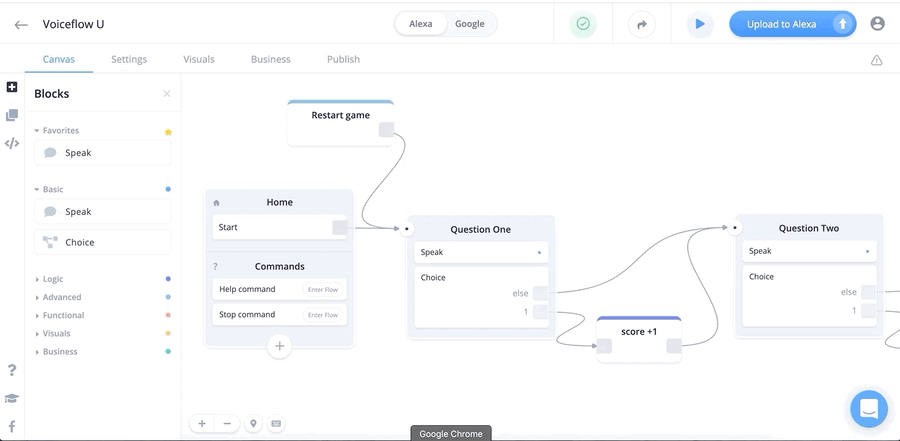
Voiceflow enables users to create and publish voice apps without coding
We welcome edits and annotations of all our content. Annotate or edit this article here
The last few years have witnessed strong growth in the field of the Internet of Things (IoT) and connected devices, mainly driven by the reduction in computing costs and growing connectivity. This has propelled the growth of smart speaker market, which includes features such as always on, social networking applications, gaming, weather information, e-book readers, music players, digital camera, and GPS navigation.
In the US, number of smart speaker owners rose 40% in 2018 to reach 66.4 million with total smart speakers in use rising to 133 million. Amazon's Echo (Alexa) leads the US market with a share of 61%, followed by Google Home which held 24% of the US smart speaker share. Alexa had more than 80,000 skills as of early 2019. Several companies, therefore, are developing hardware devices as well as software integration with Alexa or Google Home to capitalize on this growing market.
Toronto-based Voiceflow allows product teams to build voice applications for Alexa and Google Assistant. Voiceflow’s drag-and-drop interface allows teams to design, prototype and publish voice apps for Amazon Alexa and Google Assistant without needing to write any code.
The company was founded in July 2018 by Braden Ream, Tyler Han, Michael Hood and Andrew Lawrence. Voiceflow's initial idea was to develop an entertainment platform for people of all ages, consisting exclusively of voice-based content, something they called "a YouTube for voice”, under the name Storyflow. To begin with, the company decided to launch children’s stories that could be listened to on a smart speaker.
With the use of voice actors and audio engineers, Voiceflow released several interactive stories which made the company popular among parents. However, the company was facing challenges in scaling its business. To solve these scaling issues, the company created a tool for its employees to help publish individual stories.
This tool removed the complicated coding process and included a drag-and-drop feature to allow quick assembly of interactive stories. By November, the company realised that the publishers and authors were slow on adoption, so Voiceflow decided to make the internal tool available to everyone. The tool allowed its users to publish their own skills, even if they were not stories. The company also changed its name from Storyflow to Voiceflow.
In an interview with The Globe and Mail, Voiceflow's co-founder and chief product officer Michael Hood said, "We thought it would maybe be cooler just to empower people to build their own stuff rather than try to make them play by our rules. So essentially it’s like a Wordpress for voice apps, if you’re familiar with website builders."
In its first few months of operation, Voiceflow had about 1,200 users of its tool. This number has risen to more than 3,000. According to the team, the company is not cash flow positive intentionally, in order to grow faster. It currently has 12 employees.
Voiceflow is designed to be non-technical for those who don’t know how to code. For more technical users, an advanced section allows users to add logic and variables, while for enterprise customers, there is an API block that allows integration of business’s own API into their voice app.
Voiceflow is free for hobbyists with a limit of 3 projects. Users can get unlimited projects and collaboration features for $29 per month and other pro features at $99 per month. In April 2019, Voiceflow raised CAD 4.7 million (USD 3 million) in a seed round, following the takeover of US voice app design startup Invocable. Invocable's features were integrated into Voiceflow's platform, and the Invocable company shut down in July 2019.
The seed round was led by True Ventures, with participation from ProductHunt founder Ryan Hoover, Eventbrite founders Julia and Kevin Hartz, InVision founder Clark Valberg, Webflow founder Vlad Magdalin, and Fancy founder Jack Einhorn. Earlier, Voiceflow had raised a total of $650,000 in funding over two pre-seed rounds.